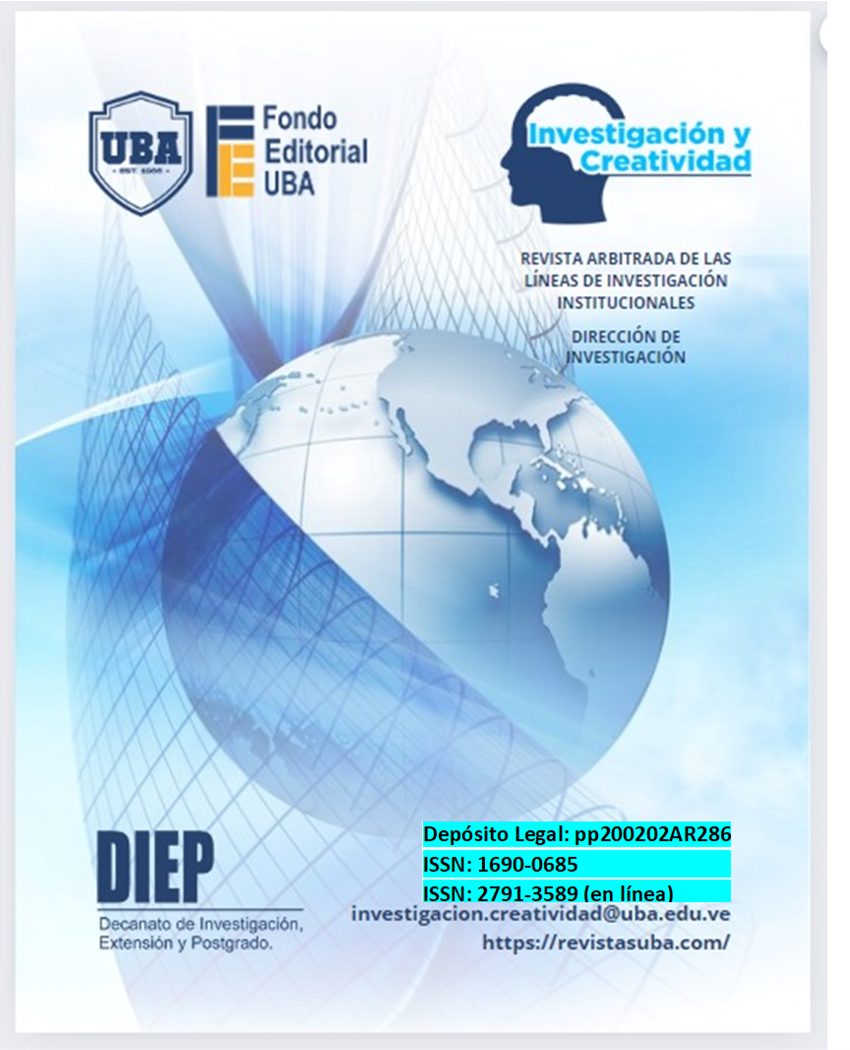CONTRADICCIONES DE LA AUTOFORMACIÓN COLECTIVA, INTEGRAL, CONTINUA Y PERMANENTE EN EL PROCESO SOCIAL DE TRABAJO
Contradictions of collective, integral, continuous and permanent self-training in the social work process
Palabras clave:
Autoformación, Colectiva, Integral, Continúa, Permanente., Self-education, Collective, Integral, Continuous, Comprehensive.Resumen
La educación universitaria se ha diversificado para insertarse en el contexto laboral, tal es el caso de la Universidad Bolivariana de Trabajadores Jesús Rivero (UBTJR), Centro de Formación CORPOELEC Bolívar y su metodología de Autoformación Colectiva, Integral, Continua y Permanente (ACICP). No obstante, es necesaria una exhaustiva revisión de esta experiencia. El propósito de este artículo es develar e interpretar las contradicciones que existen en la ACICP, de acuerdo a la metodología aplicada en el contexto del proceso social de trabajo. Se trata de un estudio cualitativo, sustentado en el paradigma sociocrítico, cuya metodología estuvo orientada por la hermenéutica de Gadamer, con entrevistas en profundidad como técnica aplicada en el marco de la segunda cohorte del Diplomado en Gestión del Sistema Eléctrico Nacional (SEN). Se utilizó el software ATLAS.ti para el análisis de las entrevistas, a partir del cual se develaron e interpretaron un conjunto de contradicciones, que permitieron formular una aproximación a la ACICP, como una estrategia de la clase trabajadora para desarrollar procesos educativos y de investigación en el marco del proceso social de trabajo. La intención del investigador es aportar hacia al mejoramiento de las condiciones de los procesos productivos y de servicios, básicos y estratégicos, del país.
Palabras clave: Autoformación, Colectiva, Integral, Continúa, Permanente.
Abstract
University education has diversified to insert itself in the labor context, such is the case of the Universidad Bolivariana de Trabajadores Jesús Rivero (UBTJR), Centro de Formación CORPOELEC Bolívar and its methodology of Collective, Integral, Continuous and Permanent Self-Education (CICPS). However, an exhaustive review of this experience is necessary. The purpose of this article is to reveal and interpret the contradictions that exist in the CICPS, according to the methodology applied in the context of the social work process. This is a qualitative study, based on the socio-critical paradigm, whose methodology was oriented by Gadamer's hermeneutics, with in-depth interviews as a technique applied in the framework of the second cohort of the Diploma in Management of the National Electric System. The ATLAS.ti software was used for the analysis of the interviews, from which a set of contradictions were revealed and interpreted, which allowed formulating an approach to the ACICP, as a strategy of the working class to develop educational and research processes in the framework of the social process of work. The intention of the researcher is to contribute to the improvement of the conditions of the productive processes and services, basic and strategic, of the country.
Key words: Self-education, Collective, Integral, Continuous, Comprehensive.
Citas
Freire, P. (2008). Pedagogía del oprimido (3.ª ed.). Siglo Veintiuno.
Gadamer, H. (1993). Verdad y método I (2.ª ed.). Sígueme. https://drive.google.com/file/d/0BzH20_Ds87woM3hSWjZIdHIzWVU/view
Harnecker, M. (1985). Los conceptos elementales del materialismo histórico (51.ª ed.). Siglo XXI. https://rebelion.org/docs/87917.pdf
Horkheimer, M. (2003). Teoría crítica (1.ª ed.). Amorrortu. https://lideresdeizquierdaprd.wordpress.com/wpcontent/uploads/2016/06/teorc3ad-critica-max-horkheimer.pdf
Izcara, S., & Andrade, K. (2003). La entrevista en profundidad: Teoría y práctica (1.ª ed.). PROMEP. https://riuat.uat.edu.mx/bitstream/123456789/1546/1/1546.pdf
Martínez, M. (2004). Ciencia y arte en la metodología cualitativa (1.ª ed.). Trillas.
Martínez, M. (2006). La investigación cualitativa (síntesis conceptual). Revista de Investigación en Psicología, 9(1), 123-146. https://doi.org/10.15381/rinvp.v9i1.4033
Marx, K. (1987). Miseria de la filosofía: Respuesta a la filosofía de la miseria de Proudhon (10.ª ed.). Siglo XXI. https://proletarios.org/books/Marx-Miseria_de_la_filosofia.pdf
Navarrete, R. (2007). Nosotros y los otros: Aproximación teórico-metodológica al estudio de la expresión de la etnicidad en la cerámica de las sociedades barrancoide y ronquinoide en el bajo y medio Orinoco (600 a.C.-300 d.C.) (1.ª ed.). Monte Ávila.
ONU. (2023). Informe de los Objetivos de Desarrollo Sostenible 2023. Autor. https://unstats.un.org/sdgs/report/2023/The-Sustainable-Development-Goals-Report-2023_Spanish.pdf

